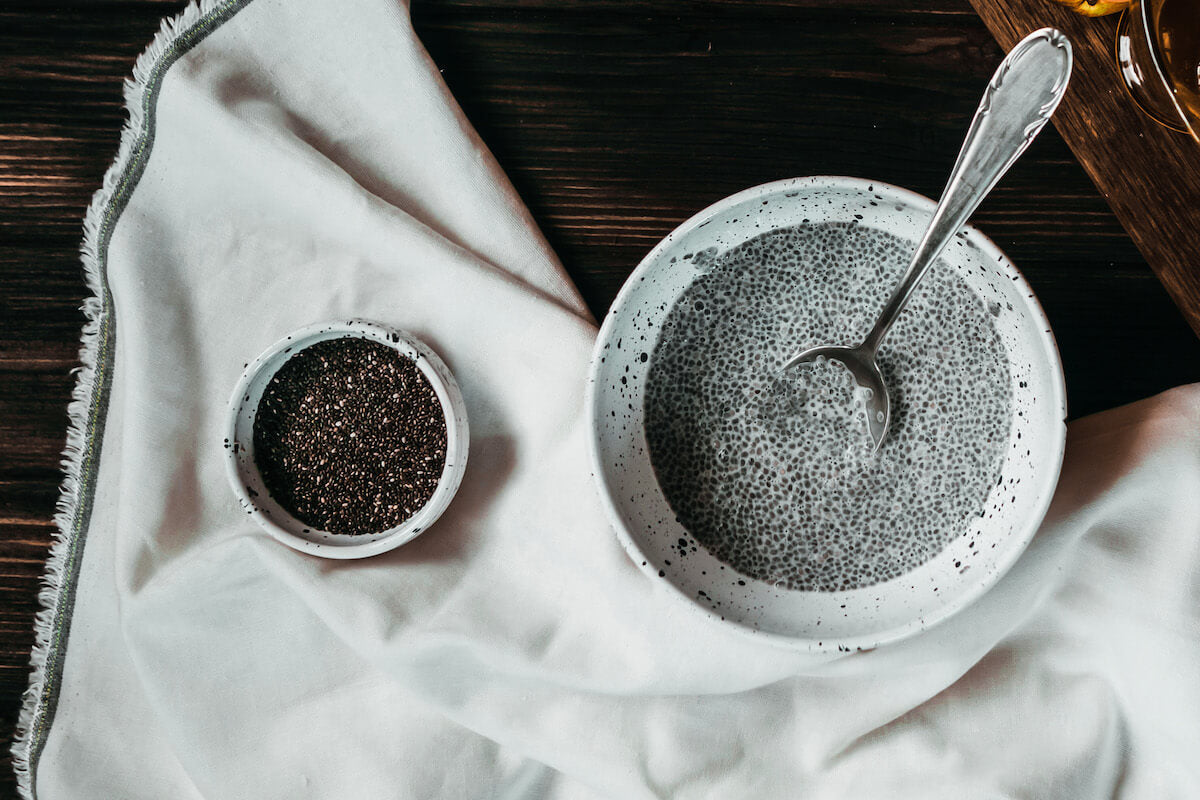When you look at a tiny black chia seed, you would have no idea that this unassuming seed could be so good for you. Sourced from the chia plant and native to Mexico and Guatemala, these little seeds are a powerhouse of nutrients and a true superfood.
Fascinatingly, chia seeds were a staple foodstuff for both the Mayans and the ancient Aztecs, so when you mix up a chia pudding you’re following in their footsteps. To give you an idea of the history and power of these seeds, the word ‘chia’ was the ancient Mayan word for ‘strength’ - so you know they pack a punch.
Despite their illustrious history, it’s only relatively recently that chia seeds have gained mainstream status and been recognised as something we should all be eating.
What are chia seeds?
Chia seeds are the seed of the chia plant, Salvia hispanica. They can be white, brown or black and are small, with a smooth, shiny texture. Although tiny, they are mighty. Two tablespoons of chia seeds provide 11g of fibre, 4g of protein, 9g of fat (5g of which are omega 3s) and calcium, manganese, magnesium, phosphorus, zinc, vitamin B3, potassium, vitamin B1 and vitamin B2. All that, and just 137 calories in two tablespoons. This nutrient profile means they’re one of the best sources in the world for these important nutrients when comparing calorie for calorie with other foods. Plus, they’re a whole grain, are generally organic, non-GMO, and are gluten free by nature.
Chia seeds are also rich in antioxidants, which fight the production of free radicals in the body. Free radicals contribute to ageing and diseases such as cancer and they can damage cell molecules. As well as being crazy good for you, the antioxidants in these seeds gives the product a long shelf life, as they protect the fats in the seeds from going rancid.
What are the health benefits of chia seeds?

Chia seeds are beneficial for a wealth of different reasons. Due to their high omega 3 content, they increase the level of omega 3s in the blood. They contain the omega 3 ALA, which has to be converted into active forms such as EPA before it can be used by the body. Studies have shown that chia seeds may be able to raise the levels of ALA in blood by up to 138% and the level of EPA in blood by up to 39%.
Chia seeds also work to improve blood sugar levels, which are crucial for optimal health and keeping your body on the straight and narrow. Studies done with animals have shown that chia seeds improve insulin resistance and improve the body’s ability to control blood sugar levels. These are important for reducing the risk of type 2 diabetes, metabolic syndrome and heart disease. Additionally, human studies found that eating bread made with chia seeds caused blood sugar levels to respond less than they do with traditional varieties of bread.
Another health benefit of chia seeds is that they help to lower blood pressure. High blood pressure is a big risk factor for many diseases, such as heart disease. It was found that eating chia seeds and chia flour lowered blood pressure in people who already had elevated levels.
In addition to lowering blood pressure, another benefit of chia seeds is lowering your risk of heart disease. This is thanks to their high protein, fibre and omega 3 content. Studies done in rats showed that the seeds could lower certain risk factors of the disease, including helping to reduce stomach fat, lower insulin resistance, helping to prevent inflammation and reducing the amounts of triglycerides in the body. It’s possible that they also help to raise levels of the good kind of cholesterol, HDL. Other studies found that chia seeds reduce blood pressure in people with hypertension, which is a big risk factor for heart disease.
As if all this wasn’t enough, chia seeds are also great to eat because of their high fibre and protein count. Many people don’t eat enough fibre, and a high intake is linked to improved gut health as well as lowering the risk of multiple diseases. Their fibre content means that they absorb water and swell up so you feel fuller and eat less, because you’re less hungry.
Their protein content comes in at around 14%, which makes them very high in protein compared to most plants. Protein is a crucial part of your diet and getting enough is key to staying fit and well, and is even more important when you’re trying to lose weight or stay lean. This benefit goes double if you’re vegan, as the seeds are a great source of non-animal-derived protein.
Chia seed recipes
Chia seeds are very easy to incorporate into your diet, and are very versatile. They are pretty much tasteless and can be added to almost anything, and their thickening effect makes them especially delicious in smoothies, soups, porridge and for adding to yogurt and cereal. Our personal favourite way to eat them is to make chia pudding, perfect for breakfast or a late night snack.


















